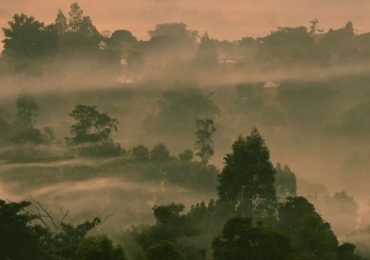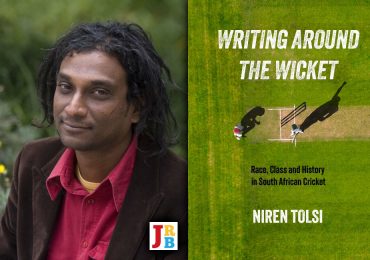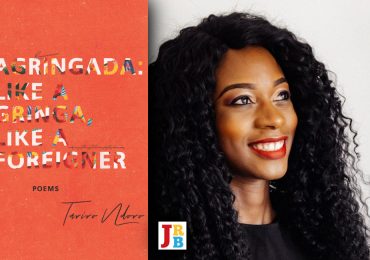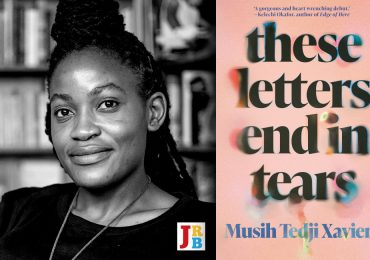Nkiacha Atemnkeng
1619 Ranch Road no. 16
San Marcos
TX 78666
USA
Akale Street
Fiango, Kumba
South West Region
Cameroon
Dear Papa,
Greetings from a sci-fi world. It’s like life on Earth is on pause right now. I’m sure you want to hear how things are in Texas. And since you’ve lost your phone, I have decided to write you a long letter—something I haven’t done in the longest time, but which seems befitting in a post-apocalyptic world.
I remember how happy you were at the Douala airport the day you came to see me off last year, as I left for Texas State University. I remember how you beamed throughout that night, revelling in the idea that I was going to study in the most powerful nation in the world. Papa, I thought so too, even though I’d read enough to know that America is no utopia. But I’m sorry to tell you now that America has crumbled from the superpower it was into a super-joke. It’s like we need a superhero like T’Challa to come here and fix things. Oh, I forgot, you don’t know who that is.
I’m in a complex state of mind right now. I’m afraid of the repercussions of the race war in America. I’m afraid of what might happen back home with the Anglophone Crisis. I’m afraid that I might get infected with Covid-19 and that all of you back home might get infected with Covid-19 too, as Cameroon is one of the worst-affected countries in Africa. I feel lonely from all the social distancing during the months of quarantine in my student apartment complex here in San Marcos.
V is doing fine down in Florida. I’m trying to look out for her, as a big brother should. Her study abroad scholarship programme to Italy in April was cancelled, and because of the pandemic she has not been able to complete her coursework. Her graduation in December will probably be delayed. Back in March, when the lockdown was enforced in the US, we were speaking on the phone, and she told me about a Sandra Bullock movie called Bird Box, and noted with disbelief how its post-apocalyptic plot was so relevant to what was happening in the world. I recalled the many movies I’d seen in which a power-hungry maniac threatens to unleash a virus that will wreak havoc upon the whole world. But in Hollywood their plans are always thwarted before the credits roll. Each time we watch such movies we think, ‘this is just entertainment, it can’t actually happen’. But right now, it’s like a supervillain has succeeded. It’s like Thanos is slowly snapping half of the world into extinction. Oh, I forgot—movies again.
I vividly remember how the pandemic began to grow in Texas in early March. The biggest literary conference in the US, the AWP (Association of Writers and Writing Programs), was being held in San Antonio this year, an hour’s drive from San Marcos. My writing programme, the Texas State MFA, was the premier sponsor of the event, and as I’m a graduate assistant, I was going to man our MFA booth at the book fair, along with two other GAs and a few student volunteers. I was so excited to attend my first AWP, and to take advantage of the opportunity to network with literary people from all over the world. We were deep into preparations with the coordinator of the MFA programme, attending planning meetings, and rigorously promoting the event on the school’s social media platforms. Throughout February, Donald Trump was reassuring the country, repeatedly, that his administration had Covid-19 under control.
As it turned out, they didn’t. New cases blew up all over the US, including in San Antonio. In early March, writers, editors, MFAs and literary magazines from across America who were supposed to attend AWP began to pull out. Our MFA’s concerns grew, and just two days before the conference we pulled out from formal participation. My excitement vanished. All the preparatory work we had done went down the drain. I also lost the money I’d paid for accommodation in San Antonio.
I did make a day trip to the conference, with the coordinator of the MFA programme. We attended a fine international panel, during which Lola Shoneyin spoke about her novel, The Secret Lives of Baba Segi’s Wives. I even managed to speak with her after the event. Then I checked out the book fair and it was back to San Marcos later that evening, where I spent the weekend in my room, writing an academic paper.
I’m sure you’d like to know how I spent my birthday on 13 March. Well, I’d had my last class before spring break the day before, and had planned to go out with my classmates for a hugless, touchless night at our MFA bar, Zelicks. One of them had created a text thread letting everybody know about the celebration. But while I was having lunch with my classmate that day, her phone started buzzing with dozens of incoming texts. All our classmates who were supposed to attend my birthday night out were cancelling. They were all concerned about the spike of cases in Texas, and the authorities had strongly advised social distancing. And that was how the world stood still, from my birthday onwards. The social distancing rules evolved into a full-scale lockdown, reminiscent of the lockdowns you’d be familiar with in the English-speaking region of Cameroon.
We didn’t resume physical classes after spring break. We navigated to remote lessons via video stream for the rest of the semester, which ended in May. Even my GA work was done remotely. The extrovert in me suffered greatly. I used to go to school to attend class, hit Zelicks after our fiction workshop on Tuesday, go to the school gym to play ‘real football’ and lift weights, go to the school football stadium to watch our school’s American football team, the Bobcats, and occasionally head to Austin for a night out in District Six. All of that was gone in a flash. European football disappeared from TV, including the second round of the Uefa Champions League that I had been anticipating so keenly, along with the NBA playoffs. I cancelled my FuboTV online sport streaming subscription and had my money refunded. I found solace in Marvel movies, but even these quickly became boring. I was trapped.
I started wandering around my apartment complex, talking to the birds and counting all the trees. I told a classmate how I found comfort in nature, and out of that she wove a mantra. ‘Nkiacha says happiness lies in the birds and the trees.’ I checked on V in Florida and all of our other family members in the US to see if they were doing alright. I watched infection figures continue to rise globally. Curiously, Covid-19 had not hit Africa then, which was a surprise to me. I felt consoled that for once a deadly disease was not being said to have originated from our continent.
Then, at the end of March, the news hit that our Makossa legend Manu Dibango, Africa’s greatest saxophonist, had died from Covid-19 in Paris. That really hurt. It’s not like I expected 86-year-old Manu to live forever. But as with all elderly people, you imagine them falling ill and that we will have time to prepare our minds for the worst. Instead he was quickly whisked away. Manu was the first superstar musician to die from the disease, and it was his death that made me realise this is not just a pandemic of rising numbers, it is a disease that can kill anybody you know.
And the number of cases grows daily. I’ve heard stories of how the Archbishop of Douala has been treating Covid-19 patients with a herbal remedy. I have also heard how a popular pastor in Douala, who claimed he could cure the disease by laying hands on the sick, has died from it. I don’t know how effective natural herbs are in the treatment of Covid-19, but knowing that natural herbs have treated many diseases before and that there is no cure for Covid-19, whatever can be done to help a patient should be done, as long as it doesn’t have bad side effects and the process doesn’t put anyone else at risk.
It is painful to learn that we are now among the most seriously affected countries in Africa. I was in communication with my former colleagues at the Douala airport when African governments were closing their borders. I think things got out of hand for us because we closed our borders too late, when passengers from Europe and Asia had already brought in the disease. We also spectacularly mismanaged our quarantine process. Our government’s response to the situation has been terrible. It makes me anxious about you and about our family in the crisis-stricken Anglophone region. How do you manage to observe social distancing rules when conflict is looming daily?
The quarantine period here helped to curb the rise in infections in Texas after the semester ended. Throughout May, there were just four deaths in Hays County, where I live, though other counties were more badly affected. However, on 1 May the governor of Texas started to open the state in phases. It was one of the most aggressive openings in America. Itching to get out, young, socially starved students in my university town flocked to drink and party, play basketball and swim. San Marcos residents love swimming and floating in their transparent river, and they plunged in like sardines to fulfil their aquatic tradition. As a result, Hays County now has one of the highest rates of both new cases and hospitalisations in America.
Then, on 25 May, George Floyd was killed in Minneapolis, and protests against systemic racism and police brutality targeting people of colour erupted across America. In the Texas capital, Austin, a Texas State student of colour named Justin Howell was critically injured by the police at a protest. There were protests in San Marcos too, for a short period, but nowhere near the scale of those in Austin and Houston, where Floyd grew up and was buried. Race is truly America’s original sin. I’ve been steeped in the history of this country’s racial inequality problem ever since. Through the endless media coverage, lengthy conversations with friends and classmates about how and why black lives matter, reading James Baldwin and watching his interviews, I have been dissecting how institutionalised racism in America works—in policing, schooling, traffic stops, health care, and everywhere else.
And as I’m experiencing how racism manifests in America, I’m trying to work through a few of the parallels with Anglophone marginalisation in Cameroon. I was so heartbroken to learn from a phone call with Uncle W that Chief Foretia of our village Letia was captured by the Cameroonian army, imprisoned and tortured for months. That they only released him and dropped the charges against him when he had been so battered it was clear he was going to die. And that he died only a few days after he was released. I remember how he used to joke and smile with us children whenever we travelled to the village to spend the holidays with our grandparents.
At about the same time as George Floyd was murdered, I heard the news that Samuel Wazizi, the Anglophone journalist who disappeared last year, had been tortured to death in military custody in Yaoundé. Arrested for criticising the government, imprisoned without trial, and his death covered up for almost a year. Reporters Without Borders calls it the worst crime against a journalist in Cameroon in the past ten years.
All this bad news from back home amid a pandemic makes me feel like I’m carrying two crosses at the same time: advocating for justice both as a marginalised Anglophone minority from Cameroon and as a Black man in America.
Texas is only partially backtracking on opening up, mainly for economic reasons, even though cases keep increasing exponentially. America now has the highest reported death rate and infection figures in the world. Meanwhile, our school is planning to restart face-to-face lessons during the summer and in the fall, in August, so I’ll start in-person classes again. I have returned to the hermit mode I was in over the past few months, though, because of the spike, all the while following up on the university’s anti-racism rhetoric in school emails. I have my reservations about how effective the school’s plans to fight racism will be, because systemic racism in America is a centuries-old problem, but I’ll see what happens.
A few weeks ago, my friend Z drove us out to visit two small Texan towns nearby, Fredericksburg and Wimberley, so that we could hike among the large rocks, walk in the woody areas and relax. After an exhausting game of basketball in a Wimberley preserve, the receptionist told us we couldn’t swim in the park’s river because it had rained the previous night. She said the section was closed because the current was too high. So hot and tired were we, after our basketball game in the Texan sun, that we desperately craved a swim to cool off, so I suggested to Z:
‘You know we could just silently sneak to the river and swim, right?’
Z looked at me and responded cautiously.
‘Not a good idea. Let me just say it honestly, Nkiacha, as a Black guy in a small Texan town, you don’t want the park guys to call the police on you.’
Z is white, but he had thought this through in a nanosecond, even before I did. It was only after that sentence that a fact really sunk into me. I could easily be the next George Floyd. If I make just one unconscious mistake in America, I could have a police knee to my neck on the banks of the San Marcos river for eight minutes and forty-six seconds, as I moan, ‘I can’t breathe’.
When I first arrived in Texas, one of America’s biggest gun-owning states, I’d consumed numerous media reports about school shootings, and that was the peak of my gun fear as I embarked on the school shuttles and went around campus. Police shootings of people of colour were a little more distant from my mind. But ever since George Floyd, I’ve watched in pain how police have brutalised protesters all over America—including white protesters—and I’ve watched the reprisals by white supremacists, and I now feel like social distancing is not just protection against catching Covid-19, but also protection against my life getting exterminated by the police.
I don’t feel entirely safe even when I’m indoors. Breonna Taylor was shot by police officers who entered her home without knocking while she was sleeping, when she wasn’t looking for anyone’s trouble. It reminds me of how you all try to keep safe by staying indoors during the lockdowns or when there are shootings in Kumba, even though the Cameroonian army has torched countless villages with Anglophones inside their homes.
Papa, I hope you stay safe, while I also try to stay safe.
Your son,
Nkiacha
~~~
- Nkiacha Atemnkeng is a writer and music enthusiast from Cameroon. His work was published in the 2015 Caine Prize anthology Lusaka Punk and Other Stories, the 2019 Short Story Day Africa Hotel Africa anthology, Of Passion and Ink: New Voices from Cameroon by Bakwa Books, as well as The Africa Report, This Is Africa, Brittle Paper and Gyara magazine, among others. He is a Goethe Institut/Sylt residency winner, and is currently enrolled in an MFA at Texas State University. Follow him on Twitter.






Keep going bro.kudos